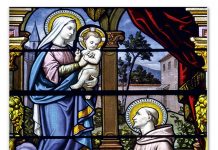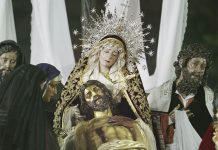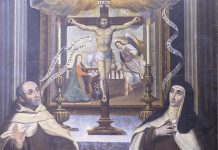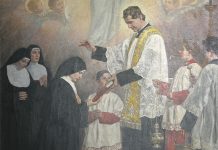On May 3, 1869, St. John Bosco told his students about a dream that he had the night before. However, so as not to alarm them too much, he did not narrate the full horror of things…
One day, the rector of a large scholastic institute asked Don Bosco: “How can I give a good education to the youth of my school?” The Saint replied simply: “By loving them!”
Indeed, countless episodes from the life of the founder of the Salesians overflow with fatherly affection for the youth that God entrusted to him, leading him to tenderly care for their material well-being. However, incomparably greater was his solicitude for their eternal salvation and his untiring dedication to prevent them from falling into sin.
To help him in this undertaking, he relied on a powerful providencial aid: his famous dreams. One of these took place on a Saturday night, May 2, 1869. On this occasion he saw “a distinguished personage” beside his bed, to whom he gave the name Friend or alternatively Guide, during his narration to the students the following day.
Was it simply a dream or a dream-revelation? Don Bosco himself did not clarify this point: “You can call it a dream or give it any other name… Call it what you wish.”
Below we present a summary, as faithful to the original as possible, of the Saint’s narration. 1
Cords pulled by a repulsive monster
I was sleeping deeply when suddenly I saw in my room, next to the bed, the man from the previous night, who said to me:
— Get up and come with me!
He led me to an immense plain, a desert with a desolate appearance. After a long journey, we arrived at a beautiful, broad and well-paved road, lined by two magnificent fences, covered in flowers, especially roses. It seemed flat and comfortable, but I soon noted that it imperceptibly sloped downwards and, although it did not seem very steep, I moved with such ease that it seemed I was being carried by the wind.

At a certain point on the journey, I noticed that all the boys of the Oratory were walking behind me, and I found myself in the midst of them. Observing them, I saw that suddenly one or another fell and was dragged away by an invisible force down a frightful slope that ended in a furnace. I perceived that they passed among many snares, some along the ground, others at the height of their heads; without realizing the danger, they were caught in the snares and threw themselves in a headlong run toward the abyss. Who was dragging them along like this?
I pulled on one of the snares, but its end did not appear. I then followed the cord and reached the opening of a frightful cavern. After much pulling, I saw an enormous and repulsive monster emerge from the cavern, firmly holding the end of a cord to which all the snares were tied. He was the one who immediately pulled to himself all those caught in the net.
— Do you know who it is? – the Guide asked.
— Yes! It is the devil who sets these snares to drag my youth to hell.
On each one of the snares was written its particular name: pride, disobedience, envy, impurity, theft, gluttony, laziness, wrath, etc. Those which dragged away the greatest number of youth were impurity, disobedience and pride.
Looking more closely, I saw that among the snares were many knives, placed there by a providential hand to cut them. The largest knife was against the snare of pride, and symbolized meditation. There were also two swords: devotion to the Blessed Sacrament, especially frequent Communion, and devotion to Our Lady. And a hammer: Confession. With these, many youths defended themselves so as not to be caught, or they cut the lines that ensnared them.
Arrival at the place “where there is no redemption”
The Guide let me observe everything, after which we resumed our journey. As we advanced, the roses became scarcer and enormous thorns became apparent. At a certain point there were only thorns amid dry branches. The way, constantly sloping downward, became increasingly dreadful, unpaved, full of holes, ledges and rubble. The more we advanced, the more rugged and rapid was the descent.
We continued descending and reached the bottom of the abyss, where we saw an immense edifice with a very high closed gate. A suffocating heat oppressed me, and a thick greenish smoke rose up around the walls grooved by blood-coloured flames. I raised my eyes to see their height: they were higher than a mountain.
— Where are we? What is this? – I asked the Guide.
— Read it on that door; by the inscription you will know.
I looked and saw written on the door: “Where there is no redemption.” We were at the gate of hell…
We walked around the walls of that horrible city. Every so often there was a bronze gate like the first, each with its inscription: “Depart from me, you cursed, into the eternal fire prepared for the devil and his angels” (Mt 25:41); “Every tree therefore that does not bear good fruit is cut down and thrown into the fire” (Mt 3:10).
We crossed an immense and cavernous gorge and once again were before the first gate, at the foot of the slope by which we had descended. Suddenly, the Guide said:
— Look!
Startled, I looked back and saw at a great distance a boy from the Oratory descending precipitously by that ramp. He wanted to stop, but was unable. He stumbled over the stones and this only served to facilitate his descent.
— Hurry! Let’s go there and help him!
— No – the Guide replied –, do you possibly believe you could stop someone who flees from the wrath of God?
All had their sin written on their forehead
Meanwhile, the young man, looking back with bulging eyes to see if God’s wrath still followed him, collided with the bronze gate. It opened with a loud noise. At the same time, with a deafening thunderclap, two, ten, one hundred, a thousand other gates were forced open by the impact of the young man who was carried by an invisible and irresistible whirlwind. I saw at the bottom something like the opening of a large furnace. Balls of fire shot into the air when he cast himself into it.
— Watch again – the Guide ordered.
I looked and saw that three other young men from the Oratory were casting themselves down by that same slope. They tumbled with incredible speed, one after the other, howling with fear. Behind them many others fell. All of them had their sin written on their forehead. I called out to them with great affliction, but they did not hear me.
Seeing so many of them fall, I sadly exclaimed:
— But then our work is futile, if this is the end that awaits so many of the boys! Is there not some way to prevent the loss of so many souls?
The Guide replied that they had not died yet, but were in a state of mortal sin and, if they did die in this state, they would end up in hell.

An immense cavern filled with fire
During this interim, another group of young men cast themselves down, and the gates were opened for a few moments. The Guide then said to me:
— You enter too.
I drew back, horrified. But I immediately felt filled with courage, thinking: “Only those who are already judged fall into hell, and I have yet to be.”
We passed through a horrible corridor that led to a vast tenebrous patio, at the back of which I saw a dreadful-looking little gate on which I read the words: “The wicked will go to the everlasting fire” (cf. Mt 25:46). All the surrounding walls were filled with inscriptions: “He will give fire to their flesh so that they burn eternally”; “they will be tormented day and night for ever and ever” (Rv 20:10). In another place: “Here is the assembly of the wicked for ever and ever.” And further on: “There is no order here, but rather eternal horror dwells”; “And the smoke of their torment goes up for ever and ever” (Rv 14:11).
As I read these inscriptions, the Guide approached and said:
— From here on, no one will have a companion to sustain them, a friend to comfort them, a heart that loves them, a compassionate gaze, or a kind word. Would you like to see or experience this?
— Only see – I replied.
He opened the little gate and an immense cavern filled with fire appeared before my eyes. It seemed to extend endlessly into the deepest bowels of the mountain. Walls, ceiling, ground, iron, stone, wood, coal, everything was white-hot and incandescent, but nothing was consumed. I am unable to describe this cavern in all its terrible reality. “For a burning place has long been prepared; yea, for the king it is made ready, its pyre made deep and wide, with fire and wood in abundance; the breath of the Lord, like a stream of brimstone, kindles it” (Is 30:33).
They were warned a thousand times…
As I looked on aghast, I saw a youth throw himself into the midst of the fire. He became incandescent like the rest of the cavern and remained there motionless. Horrified, I recognized him as one of my sons! Right afterwards another boy from the Oratory cast himself into the cavern. Others, likewise despairing, arrived after him. Their number continued to grow, and all cried out and remained motionless and incandescent, just like the previous ones. I then recalled the admonition from the Bible: “in the place where the tree falls, there it will lie” (Eccl 11:3). As they fell into hell, so they would remain eternally.
— But did they not know that they would end up here? – I asked the Guide.
— Of course they knew! They were warned a thousand times, but they rush here because they do not detest sin and do not want to abandon it; they refused the mercy of God that unceasingly called them to penance.
The Friend led me to another place, over whose entrance was written: “Where their worm does not die, and the fire is not quenched” (Mk 9:48). And he said to me:
— Now you should also go into that region of fire that you saw.
— No! No! – I replied in terror.
— Which do you prefer: to go to hell and free your boys, or to stay outside and leave them amidst so many torments? Therefore, enter and see the goodness of God, who lovingly uses a thousand means to call your boys to penance, and to save them from eternal death.
The cause of eternal perdition for many
I had hardly stepped on the threshold of the cavern when I was unexpectedly transported to a magnificent room with crystal doors. Over these, at regular intervals, hung large veils that covered many other rooms adjacent to the cavern. The Guide showed me a veil upon which was written “Sixth Commandment,” and he exclaimed:
— The transgression of this Commandment is the cause of the eternal perdition of many young people!
— But do they not go to Confession?
— Yes, but they do not properly confess some sins or omit to confess them at all. Some were not repentant, nor did they intend to amend themselves. And now do you want to see why God’s mercy has brought you here?
Having said this, he raised the veil and I saw a group of boys from the Oratory condemned for this sin. Among them were some who were apparently well-behaved.
— What should I say to them? – I asked.
— Preach against impurity everywhere. It is enough to warn them in general terms. To practise virtue, the grace of God is needed; and this will never be wanting to them, if it is requested. Prayer, then, and sacrifice on your part. As for those who hear your exhortations, let them examine their conscience, and it will indicate to them what they should do.
Those who do not pray will be lost!
The Guide raised other veils, and I could see many of our boys. On one veil was written: “Root of all evil.” And he immediately asked me:
— Do you know what this epigraph refers to?
— It can only be pride.
— Yes, generically it is pride; but it is concretely disobedience. Adam and Eve were expelled from Paradise for this sin. Disobedience is the root of all evils.
— And what should I say to my boys on this point?
After enumerating different transgressions committed by students of the Oratory, which are the cause of serious disorders, the Guide warned:
— Woe to those who neglect prayer! Those who do not pray will be lost! Some are here because instead of singing the praises or the Office of the Blessed Virgin Mary, they read books that deal with everything but religion, and some even read forbidden books.
— What counsel can I give them to help them avoid the catastrophe of ending up here?
— Show them how obedience to God, to the Church, to parents and superiors will save them. Also recommend that they avoid idleness, which was the cause of the sin of David. They should always be occupied, not giving the devil the opportunity to attack them.

A quick touch on the outer wall
I bowed my head and promised; then, no longer able to endure that horror, I beseeched the Friend:
— I am grateful for the charity you have shown me, but I implore you to take me from here.
— Come with me – he said.
We left the room, and crossed the horrible patio and long corridor in an instant. Before crossing the threshold of the last bronze gate, he once again turned to me and exclaimed:
— You have seen the torments of others, now you too must feel a little of the torment of hell.
— No! No! – I cried out in horror.
— Do not fear; it is only a sample. Touch this wall.
I wanted to recoil, but he seized my arm and brought me close to the wall, ordering me:
— Touch it quickly just once, so that you can say you visited and touched the walls of eternal torments.
Seeing that I resisted, he forced my hand open and made me touch it to the stone of the wall. At that moment, I felt such an intensely painful burning sensation that, while jumping back and crying out loudly, I awoke. I realized I was sitting on my bed, rubbing the hand that burned. In the morning, I noticed that it was truly swollen; and the imaginary impression of that fire was so strong that a short time later the skin on the palm of my hand fell off and was replaced.
* * *
Out of prudence, so as not to alarm you too much, I did not depict the full horror of these things, just as I saw them. I merely made a summary of what I saw in very long dreams.
Later I will give lessons on human respect, the Sixth and Seventh Commandments, as well as on pride. Now I limit myself to explaining these dreams, which are in complete agreement with Sacred Scripture; in truth, they are nothing more than a commentary on what can be read therein in this regard. ◊
Notes
1 The entire text is taken from the Italian original: LEMOYNE, SDB, Giovanni Battista. Memorie biografiche del Venerabile Don Giovanni Bosco. Torino: Buona Stampa, 1917, v.IX, p.166-181. Available at: http://www.donboscosanto.eu/memorie_biografiche.







